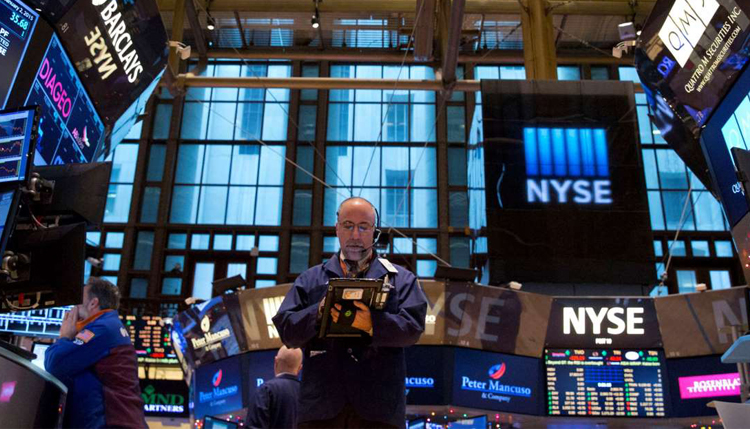U.S. stocks plummeted on Wednesday as a sharp drop in tech shares and worries about corporate earnings added fuel to this month’s steep pullback.
The Dow Jones Industrial Average dropped 608.01 points at 24,583.42 and erased all of its gains for 2018. The S&P 500 dropped 3.1 percent to 2,656.10 and also turned negative for the year. The Nasdaq Composite fell 4.4 percent to 7,108.40— entering correction territory — as Facebook, Amazon, Netflix and Alphabet all traded lower.
“An increasingly murky macro picture is clouding the 2019 earnings outlook leaving investors to largely shrug off a solid start to the third quarter earnings season,” said Alec Young, managing director of global markets research at FTSE Russell. “While valuations have certainly come down in recent weeks, at 16 times forward earnings for the Russell 1000 index, they aren’t in the bargain basement by any means, especially if earnings growth slows more than expected next year.”
Stocks have taken a beating this month. The Dow has dropped 7.1 percent in October, while the S&P 500 has pulled back 8.9 percent. The Nasdaq, meanwhile, has tumbled 11.7 percent.
Netflix tumbled 9.4 percent as investors second-guessed valuations for the once high-flying video streamer. Facebook and Alphabet both fell more than 5 percent, while Apple dropped 3.4 percent. AT&T, meanwhile, dropped more than 8.1 percent after releasing its quarterly results.
Worries about a slowing economy under pressure from rising interest rates grew after the Commerce Department said new home sales fell to a two-year low. The data also hit homebuilder stocks.The SPDR S&P Homebuilders ETF (XHB) dropped 3.5 percent.
“The housing numbers were not good,” said JJ Kinahan, chief market strategist at TD Ameritrade. “There’s a lot of uncertainty heading into the end of the year. It just feels like people feel more comfortable spending short-term rather than long term.”
Bank shares fell on fears of slowing growth for mortgage and other loans. The SPDR S&P Bank ETF (KBE) dropped 4.1 percent. Shares of J.P. Morgan Chase and Citigroup both pulled back more than 1.5 percent. Bank of America’s stock dropped 3.1 percent.
Investors have been grappling with increasing market volatility of late. The Cboe Volatility Index (VIX), widely regarded as the best gauge of fear in the market, traded above 24 on Wednesday and is up more than 100 percent this month.
Several factors have conspired to knock markets this month — some earnings disappointment, a brewing conflict between Italy and the European Union over budget spending, criticism of oil power Saudi Arabia over the killing of a dissident journalist and finally, worries that world growth is losing steam.
“Since early February through late September, US stocks were on a tear, while stocks overseas were mostly stumbling,” said Ed Yardeni, president and chief investment strategist at Yardeni Research. “So far this month, the US has coupled with the bearish sentiment overseas.”
“Valuation multiples have dropped sharply this month, making stocks attractive,” he said in a note. This is more of a panic attack “rather than the beginning of a bear market; we believe that the bull market will continue into next year. The next relief rally should be triggered by continued signs of economic growth combined with subdued inflation.”
Earlier in the session, the Dow rose more than 100 points on the back of better-than-expected results from Boeing. The aerospace giant also raised its full-year guidance on earnings and sales. The report sent the stock up more than 1 percent.
The results come as investors slog through the busiest week of the earnings season. More than 100 S&P 500 companies are scheduled to report this week, including Amazon, Alphabet and NBCUniversal-parent Comcast. So far, 80 percent of the companies that have reported have topped earnings expectations, according to data from FactSet.
Source: CNBC


